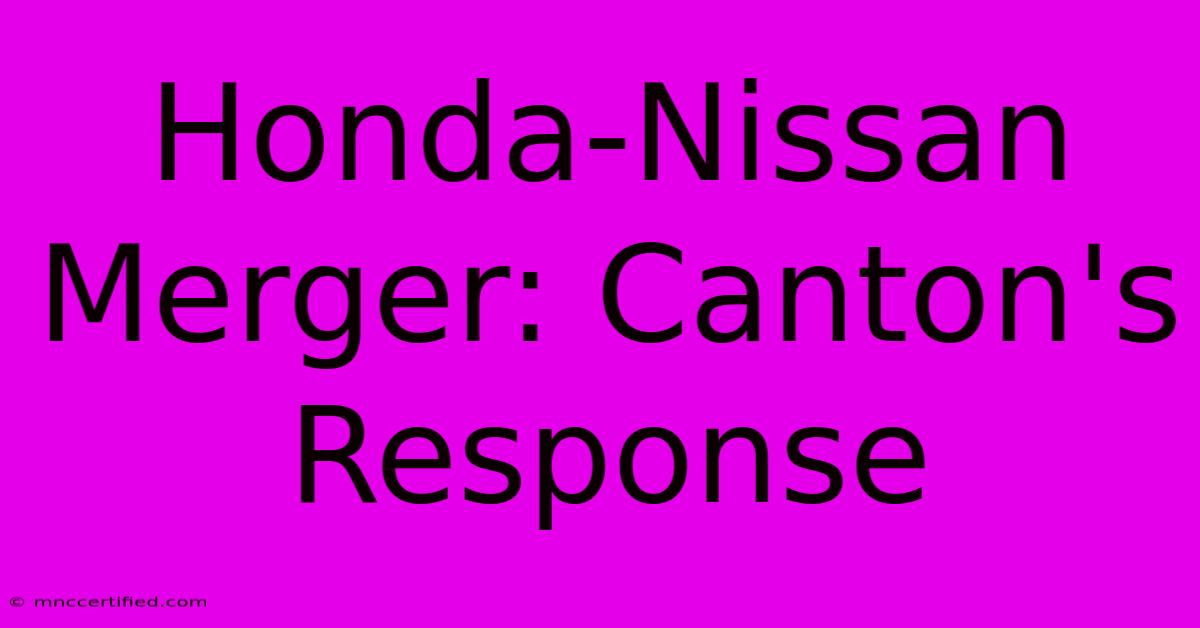Honda-Nissan Merger: Canton's Response

Table of Contents
Honda-Nissan Merger: Canton's Response – A Deep Dive into Economic Impacts and Community Concerns
The hypothetical merger of Honda and Nissan, two automotive giants with significant operations in Canton, Ohio, would send shockwaves through the local economy and community. While such a merger isn't currently on the table, exploring the potential consequences allows for proactive planning and informed discussion about the future of Canton's automotive industry. This article delves into the potential economic impacts, community concerns, and possible responses to such a significant event.
Potential Economic Impacts: A Double-Edged Sword
A Honda-Nissan merger in Canton could bring about both positive and negative economic consequences. On the positive side:
- Increased Efficiency and Synergies: Combining operations could lead to economies of scale, streamlining production, reducing overhead costs, and potentially leading to increased investment in the Canton facilities. This could translate to job creation in certain areas and a boost to the local tax base.
- Enhanced Innovation and Technology: The combined resources and expertise of both companies could fuel innovation, leading to the development of new technologies and vehicles, potentially attracting further investment and skilled labor to Canton. This could solidify Canton's position as a major automotive hub.
- Strengthened Global Competitiveness: A merged entity would have greater global market reach and bargaining power, potentially shielding Canton's operations from the volatility of the international automotive market.
However, significant negative impacts are also possible:
- Job Losses Due to Redundancy: Mergers often result in job cuts as overlapping roles and departments are eliminated. This could lead to significant unemployment in Canton, impacting families and the local economy. The fear of plant closures would be a major concern.
- Reduced Local Control and Decision-Making: A merged company may centralize decision-making, potentially diminishing the local influence on production choices and future investment in Canton.
- Shift in Focus and Product Lines: The merger could lead to a shift in production priorities, potentially phasing out certain vehicle models currently produced in Canton, leading to job displacement and a negative impact on the local supply chain.
Community Concerns: Addressing the Uncertainty
The uncertainty surrounding a potential Honda-Nissan merger in Canton would understandably create considerable anxiety among residents. Key community concerns include:
- Job Security: The biggest concern is undoubtedly the potential loss of jobs. Residents need assurances regarding the future of their employment and the availability of retraining programs for displaced workers.
- Economic Stability: The ripple effect of job losses on local businesses, schools, and community services needs to be addressed. A plan to mitigate the economic fallout is crucial.
- Community Identity: The automotive industry is deeply woven into the fabric of Canton's identity. Any significant changes could impact the community's sense of place and pride.
Canton's Response: Proactive Strategies for a Positive Outcome
To mitigate potential negative consequences and capitalize on potential opportunities, Canton needs a proactive and multifaceted response:
- Open Communication and Transparency: Maintaining open communication channels with both Honda and Nissan is paramount. The city needs to understand the companies' plans and engage in constructive dialogue to address concerns.
- Strategic Partnerships and Workforce Development: Collaboration with educational institutions and workforce development agencies is crucial to train the local workforce for future opportunities within the automotive industry. This could include reskilling and upskilling programs to prepare workers for new roles.
- Attracting New Investment: Canton needs to actively attract new businesses and investments to diversify its economy and lessen its dependence on the automotive sector.
- Community Engagement and Support: Active community engagement is critical. Town halls, forums, and other platforms should be used to address concerns, share information, and build a unified front to negotiate for the best possible outcome.
Conclusion: Navigating the Uncertain Future
The hypothetical merger of Honda and Nissan in Canton presents both significant opportunities and considerable challenges. By proactively addressing potential economic impacts, community concerns, and implementing strategic responses, Canton can strive to navigate this uncertain future and secure a positive outcome for its residents and its economy. The key is preparation, collaboration, and a clear vision for the future of Canton's automotive industry. This proactive approach will ensure the community is well-positioned, whatever the future holds.

Thank you for visiting our website wich cover about Honda-Nissan Merger: Canton's Response. We hope the information provided has been useful to you. Feel free to contact us if you have any questions or need further assistance. See you next time and dont miss to bookmark.
Featured Posts
-
Cowboys Eagles Time Change 1 Pm Kickoff
Dec 24, 2024
-
Ocean Rescue California Wharf Fall
Dec 24, 2024
-
Loyalty Card Glitch Morrisons Discounts
Dec 24, 2024
-
Assad Family Responds To Divorce Rumors
Dec 24, 2024
-
Norads Santa Tracker Evolution
Dec 24, 2024